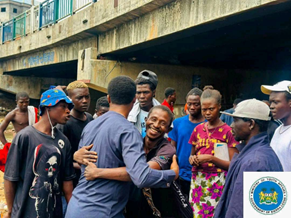Youth Minister Promises Healing & Hope To Youths Living Under Juba Bridge
Demonstrating a powerful show of empathy and action, the Minister of Youth Affairs, Ibrahim Sannoh, has reached out to some of Freetown’s most vulnerable young people living under the Juba Bridge, offering them a renewed sense of hope and support.

Accompanied by his Deputy Minister, the Director of Programs and the Director of Youth in Livelihood Skills, the Minister spent several hours under the bridge listening to personal stories of addiction, homelessness and perseverance. The visit formed part of the Ministry’s broader commitment to engaging directly with at-risk youths across the country.
“This is not a show. It’s a responsibility,” Ibrahim Sannoh emphasized. “Our youths deserve opportunities to heal, grow and contribute. No one should be left behind.”
Among those who spoke was Rosamond, a young woman with notable reading and writing skills, despite her difficult living conditions. She shared her aspirations and disclosed a serious eye condition that has hindered her progress. The Youth Affairs Minister pledged immediate support to ensure she receives both medical treatment and access to education.
Another youth, Alie Foster, who lost a leg in an accident and suffers chronic pain in the remaining limb, moved the Minister with his story. The Minister committed to facilitating the medical care Alie urgently needs.
The visit signaled a deepened effort by the Ministry to not only listen, but to act. Ibrahim Sannoh assured the group that this would not be a one-off visit, promising consistent follow-up and inclusion in the Ministry’s rehabilitation and livelihood programs.
For many of the young people under the Juba Bridge, the outreach marked the first time they had been acknowledged by Government officials. Gratitude was palpable as they welcomed the delegation and expressed hope for a better future.
The Ministry of Youth Affairs says it is determined to continue reaching forgotten corners of society and to reintegrate marginalized youths into programs that will empower them to rebuild their lives with dignity.
In another development, the Minister of Youth Affairs, Ibrahim Sannoh, received high-level delegations from both the German and Chinese Governments to discuss strategic partnerships in youth employment and empowerment.
In two separate, but equally impactful meetings, the Minister presented his strategic roadmap for youth development, aligning it with Sierra Leone’s Medium-Term National Development Plan (2024–2030) and President Bio’s Big Five Agenda, particularly Pillar 3 on Youth Empowerment.
Led by Mr. Johannes, representative of the German Embassy, and Mr. Johan, Head of Programs at GIZ, the German delegation paid a courtesy call to the Youth Affairs Ministry to reaffirm Germany’s support to Sierra Leone’s flagship Youth Employment Scheme (YES).
The delegation outlined the delivery architecture of YES, sharing insights into ongoing strategies to tackle youth unemployment through skills training, job creation and entrepreneurship. Ibrahim Sannoh, in response, presented his priorities based on findings from the recent Status of Youth Report, placing strong emphasis on inclusive growth, youth-led innovation and sustainable employment initiatives.
He spotlighted a key intervention under YES; support for rural youths in cash crop cultivation and poultry farming. The initiative will provide technical training, starter packs and market linkage to boost agribusiness among youths, thereby promoting food security and local economic development.
On the same day, the Minister held another strategic engagement with H.E. Wang Qing, Chinese Ambassador to Sierra Leone, at the Chinese Embassy in Freetown. The meeting centered on enhancing bilateral cooperation in youth empowerment through agriculture, innovation and capacity-building.
Ambassador Wang Qing expressed full support for the Minister’s vision and pledged increased technical and financial support via China Aid. He also committed to leveraging the Embassy’s Trade and Economic Office to publicize the youth strategy and attract international investment.
A central component of the collaboration includes a district-level agricultural pilot, targeting at least one chiefdom per district. The pilot will focus on cultivating three priority ventures, rice, poultry and a selected cash crop, driven by youths to promote entrepreneurship and rural development.
These engagements signal a renewed momentum in international cooperation on youth development in Sierra Leone. Germany and China, two of Sierra Leone’s most active development partners, have both reaffirmed their commitment to the empowerment of young people through innovative, agriculture-led and employment-focused strategies.
The Youth Affairs Minister described the partnerships as “critical to unlocking the potential of Sierra Leonean youths and building sustainable pathways to prosperity.”
With the Ministry of Youth Affairs advancing its national strategy, these diplomatic strides provide a strong foundation for impactful, youth-driven development across the country.